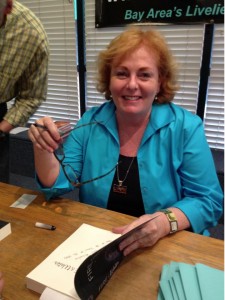When Bipolar Goes Underground
I know, it’s soooo obvious. It’s vicarious therapy … via blog. How trite and predictable.
Gimmie a break. How am I supposed to find a therapist in Serbia, who speaks English and knows something about post-adoption issues and bipolar disorder and will reassure me I’m not that crazy?
Betsy Graziani Fasbinder raised an important detail in her lyrical novel, Fire & Water. Betsy and I have already talked about Helping a Loved One with Bipolar and The Link Between Creativity and Bipolar in other installments of Heart-to-Heart with a Therapist.
To understand bipolar disorder, you must also address dormancy. The person with BPD is able to remain stable, without drugs, and live a normal life … for years.

The three sides of BPD: The Normal Me, The Depressed, The Manic … but of course, it’s much more complicated than that.
Dormancy defined
Betsy — BPD also has another intriguing feature that worked well for my novel Fire & Water, if not for the real-life sufferers and their families.
Bipolar disorder can go dormant, so to speak. One with BPD can have long periods (even many years) of functioning without an episode of mania or severe depression. Family members and loved ones can be fooled by these periods of dormancy and surprised when a new episode erupts.
In the case of my characters, Kate meets Jake when he’s got a pretty functional level of hyperactivity and a functioning level of creativity that may not be full-blown mania. It’s easy for her to dismiss some of his red flag behaviors as “temperamental artist” behaviors rather than mental illness. By the time the distinction is clear, she’s already in deep with him. That’s the crux of the story, really. She’s also a doctor who is used to being able to “fix” a problem medically. It’s agonizing for her not to be able to fix Jake.
Understanding a bipolar diagnosis
Laura — That is so interesting, because I feel like bipolar tendencies underscored much of what I did in adolescence. I would have periods of intense activity followed by sickness or lethargy or something akin to depression, although I never knew to call it that.
When I was finally diagnosed, after an actual full blown, delusional manic episode, I took it really hard. I was so disappointed in myself that I had brought on the episode myself, that my mind had betrayed me.
What is your take on how patients handle their diagnosis? I was diagnosed with bipolar disorder–largely to get access health insurance and other services–but even so, I tended to define everything I did as either manic or depressive. It turns out it’s a lot more complicated than that. (And I’m not just talking about mixed states.) When Corie Skolnick described the delusions in Adopted Reality as “a very creative response to overwhelming stimuli,” I had somewhat of an “ah ha” moment.
 Betsy — I struggle too, Laura, with the necessity of labeling a mental illness (particularly for the purposes of insurance coverage). But I’ve embraced it as a necessary way to develop a shared language, not only between healthcare providers and insurance companies, but for those who struggle with these disorders.
Betsy — I struggle too, Laura, with the necessity of labeling a mental illness (particularly for the purposes of insurance coverage). But I’ve embraced it as a necessary way to develop a shared language, not only between healthcare providers and insurance companies, but for those who struggle with these disorders.
But the label is inadequate if you try to apply it to every aspect of your life. Anyone who has BPD (or any other mental illness, physical illness, or addiction) is also way more than any labeled diagnosis. If I suffer diabetes, or cancer, or MS, would I attribute every exchange, every incident in my life to those diseases?
No, certainly not. But we sort of do that with mental illness and addiction, don’t we?
I think this is evidence of our remaining stigma about mental illness and the desire to distinguish metal health from physical health. They’re just not as discreet as we would like to think.
I think of mind, body, and spirit as a braid, with the three parts weaving in and around one another. At any point in the braid, it’s not easy to distinguish one from another. Our sorrows can manifest physically. Our physical illness (say a high fever) can manifest as psychosis with hallucinations and delusions. Our spiritual malaise can manifest as depression.
Who’s to say which is which exactly?
* * * * *
Read more of my converstations with Betsy here–
- Heart-to-Heart with a Therapist #1–Helping a Loved One with Bipolar
- Heart-to-Heart with a Therapist #2–Creativity and Bipolar
- Breaking the Cycle of Secrets and Standing in Truth
- Catholic Shame, Secrets & Lies–Fire & Water Author Interview
About Betsy – In both her works of memoir and fiction, Betsy Graziani Fasbinder explores the unending complications of people living, working, and loving one another. As a practicing therapist for more than twenty years, she has been witness to the heartbreak, healing, and heroism of people from all walks of life. Fire & Water, available on Amazon, is her debut novel published by She Writes Press.
Connect with Betsy her website, or twitter @WriterBGF
* * * * *
Need something to read this weekend?
The new and improved 2nd edition of Adopted Reality, A Memoir is available FREE on Story Cartel, in exchange for posting an honest review on Amazon. Click here to download your free copy today.
Image from freedigitalphotos.net, photo of Betsy courtesy of the author.





Betsy's book is on my kindle! Laura, you are the best interviewer out there.
Such an important post.
In the manic phase of bipolar disorder,sentiments of increased energy,creativity, and happiness are basic.Individuals experiencing a manic episode frequently talk extremely fast,rest practically nothing, and are hyperactive.They might likewise feel like they're almighty,powerful, or bound for greatness.
@Marion Taylor.
This is absolutely fascinating. Very cool article. Thanks for the information
http://itsthevideo.com/enqn/5h2p9xghrsg.htmliPhone 6s plusのアプリ
Hi there I just thought I would tell you that I did enjoy reading your webpage and to wish you good luck with it in the coming years – Lauryn Pilates
In Laura Denis blog we have the problem about when bipolar goes underground. It is so dangerous causing the depression sometimes and internal weakness and it has to be fixing medically with the help of doctor.
My bi polar has laid dormant( so to speak) for 2 years now,I remember how terrible it was, but I do not care for the meds, will it be a terrible episode when it raises its ugly head again? Will I even survive this one? These are things that are just on my mind thank you
Hi, I have gone through your blog. It's very informative and helpful for people who suffer from this disorder and also for those whose loved ones are suffering from it. We are also a team of researchers and have been sharing info related to mental health disorders. Kindly check our blog too which is related to the same disorder and share your valuable views and suggestions so that we can improve.
Thanking you.
California Medicals